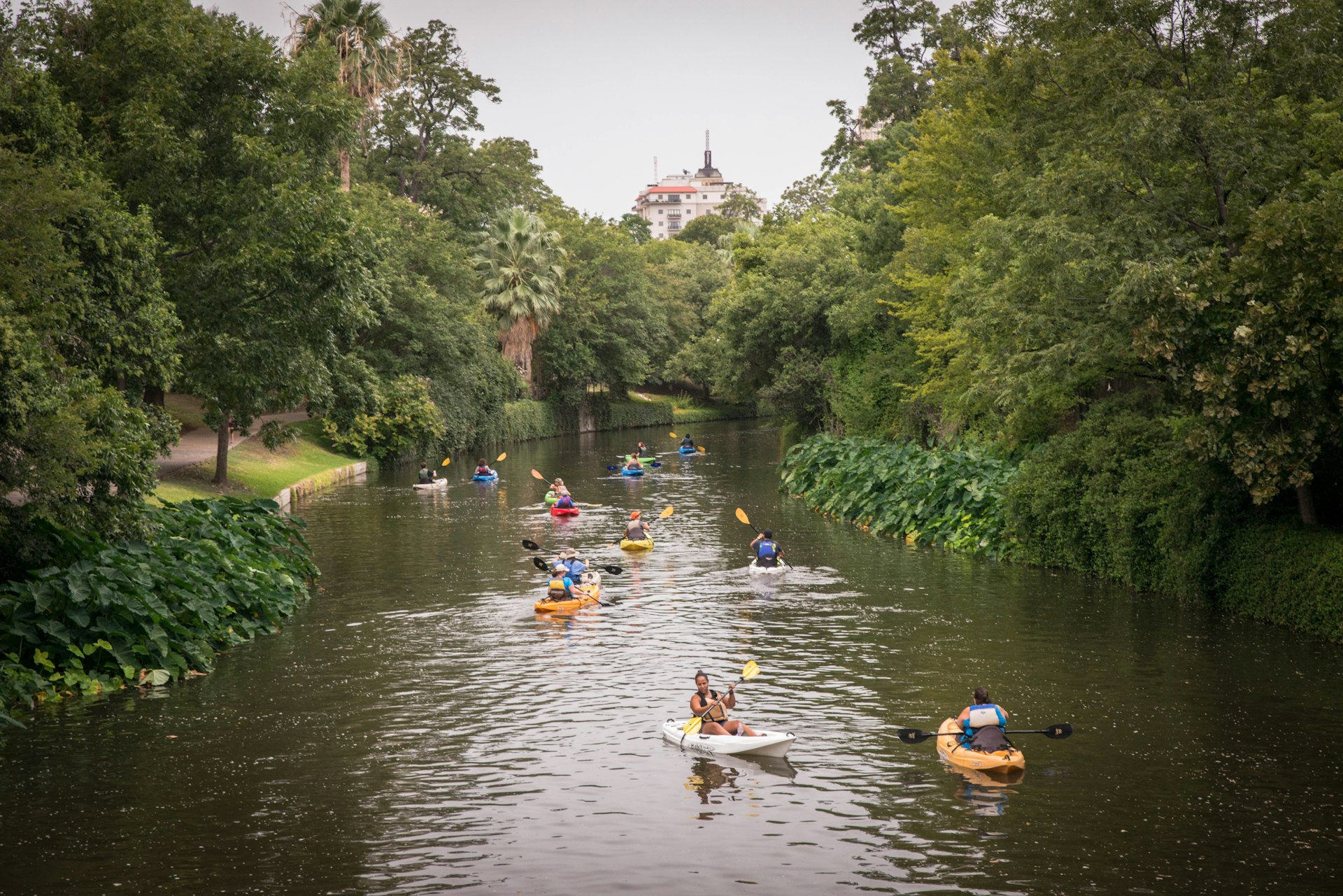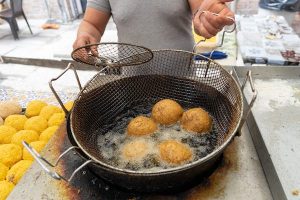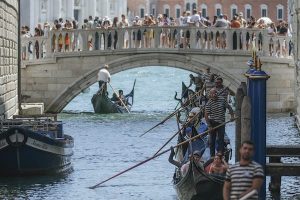
San Antonio – variously known as “Alamo City,” the “River City” and “Military City” – is home to some truly iconic destinations and a few hidden gems.
A few common attractions are sure to show up on any to-do list: the Alamo, the River Walk and perhaps a trip to the blossoming Pearl District.
But once those boxes have been checked, what’s next? And when is the best time to see this city of many names at its best? Here’s when to go to San Antonio for festivals, food, the outdoors and more.
Get more travel inspiration, tips and exclusive offers sent straight to your inbox with our weekly newsletter.  Kayaking is a great way to experience the San Antonio River © Adam Stocker / Shutterstock
Kayaking is a great way to experience the San Antonio River © Adam Stocker / Shutterstock
Visit in May to August to get outdoors in San Antonio
If you associate heat with San Antonio, you are not alone. By the time May rolls around, daily highs typically average between 85-95°F, with humidity above 60%. Despite this extreme heat, many locals invite friends and family to visit each summer. Because that is when San Antonio’s true colors can be seen.
And the best way to see those colors firsthand? Fireworks displays. Which happen all summer long.
Come Memorial Day, San Antonians celebrate that one out of every eight San Antonio residents is directly connected to the military in some way. This can be seen – and heard – in the sky throughout the summer.
People here truly love their fireworks. On July 4, the most extravagant (legal) displays can be found at Woodlawn Lake – but rest assured (local laws notwithstanding) that explosions can be seen and heard from almost any location come sundown.
By day, you can escape the heat with a long river float on the Comal River in nearby New Braunfels, take a dip on the beaches of Medina Lake or bring the whole family to San Pedro Springs.
 San Antonio Fiesta is a multi-week celebration that takes over the city each spring © Joshua Rainey Photography / Shutterstock
San Antonio Fiesta is a multi-week celebration that takes over the city each spring © Joshua Rainey Photography / Shutterstock
January to April is party season, with the rodeo, Fiesta and more
Locals are partial to springtime in San Antonio: temperatures are at their most tolerable, and the city awakens as each flower blooms. The kickoff to the season is the San Antonio Stock Show and Rodeo each February. Bring the kids to enjoy carnival rides and an opportunity to pet livestock – then come back later with friends for one of the many concerts that take place each night.
Visitors who can’t make it in time for the rodeo can still take advantage of the lower seasonal hotel rates to check out the Alamo on the anniversary of its battle (February 23), or set up a personal photo shoot in a field of bluebonnets (watch out for those rattlesnakes). You can even try and spot PGA legends at the Valero Texas Open.
But the real gem of the season is Fiesta.
This annual multi-week celebration is one of San Antonio’s biggest draws. As April rolls around, Mission City plays host to countless parades, festivals and parties, kicking off with an Oyster Bake that draws 60,000–70,000 guests annually. Many parades occur throughout the celebration, most notably the Battle of Flowers Parade, the original official Fiesta event. Led by a passionate group of local women since 1891, this parade commemorates fallen heroes of the Alamo and San Jacinto Battles and is a local favorite (many in the area even get the day off work to celebrate).
Another key parade winds its way through San Antonio’s King William District toward the end of Fiesta, showcasing a collection of historic houses built by German settlers after the Civil War. The King William Parade and King William Fair celebrate the neighborhood’s rich history and support the community each year.
NIOSA (Night in Old San Antonio), is the most exciting of all Fiesta’s events. This four-night festival takes place in the heart of downtown and features food booths, dancing, original local artwork, lots of drinks and more bright colors than one can imagine.
This is the real San Antonio. According to the festival organizers, locals consume “17,000 lbs of beef; 11,000 lbs of chicken; 5000lbs of sausage; 3000 turkey legs; 25,000 buns; 30,000 tortillas; 2000lbs of masa; 6000 tamales; 15,000lbs of fruits and vegetables; and 1000lbs of guacamole.” How could anyone resist such Texas-sized excess?
 Celebrate Día de los Muertos with locals in October © Moab Republic / Shutterstock
Celebrate Día de los Muertos with locals in October © Moab Republic / Shutterstock
Watch the city twinkle for the holidays from September to December
Once summer has come and gone, the tourist season also begins to wane – which means great deals on lodging. Still, there is plenty to see throughout the fall without worrying about the imposing summer sun.
Fright fans can head to the area amusement parks for seasonal spookiness and the 13th Floor Haunted House on Commerce St is a long-standing Halloween tradition.
Perhaps the prettiest way to see local icons the Alamo and River Walk is when they’re twinkling with holiday lights. In December, layer-wearing visitors take rides on riverboats beneath the cascading colored lights hanging from the bald cypress trees overhead. While the city no longer decorates a tree in Alamo Plaza, there is no shortage of holiday spirit to be found there, with carolers and Santas spotted daily.
In true San Antonio tradition, the city wouldn’t be able to ring in the new year without another incredible light show. Visitors looking to celebrate New Year’s Eve should head down to Hemisfair Plaza to watch the official fireworks display illuminate the downtown skyline.
 The San Antonio River Walk is always festive during the holiday season © Kevin Seagrave / Shutterstock
The San Antonio River Walk is always festive during the holiday season © Kevin Seagrave / Shutterstock
Source



